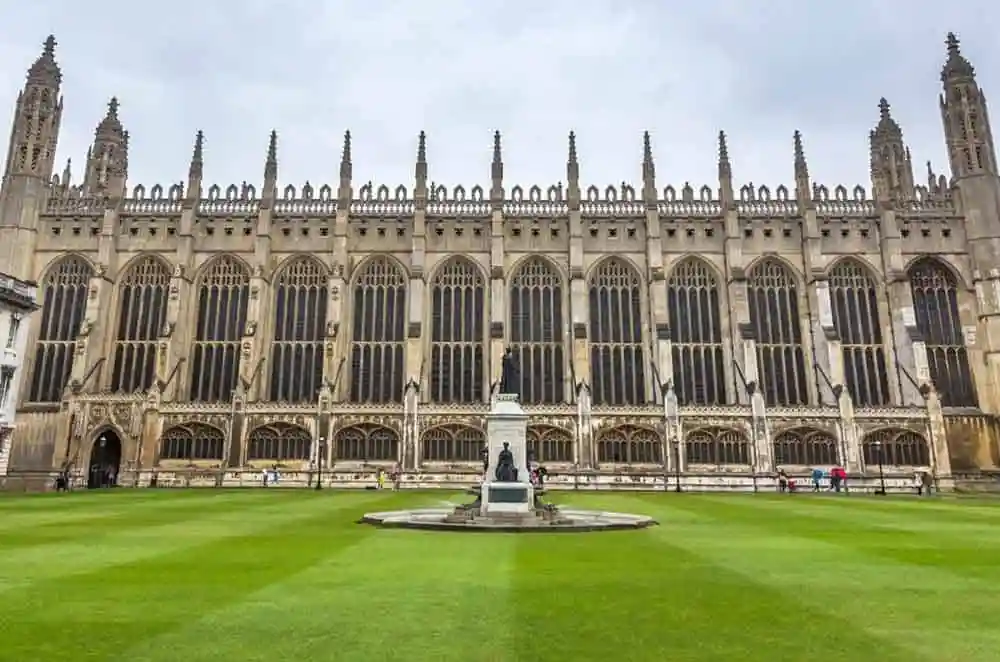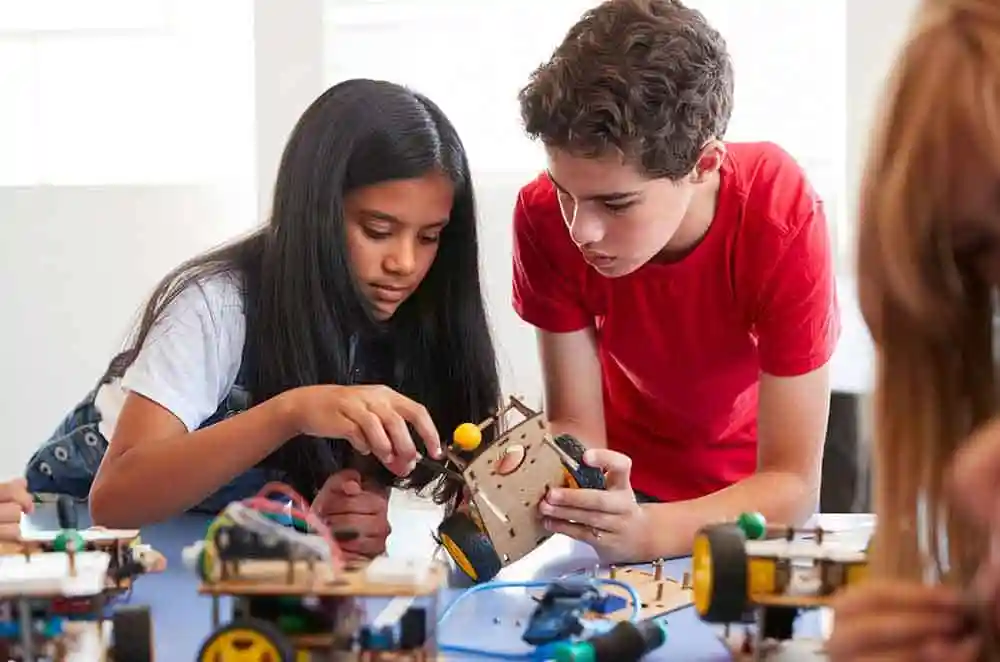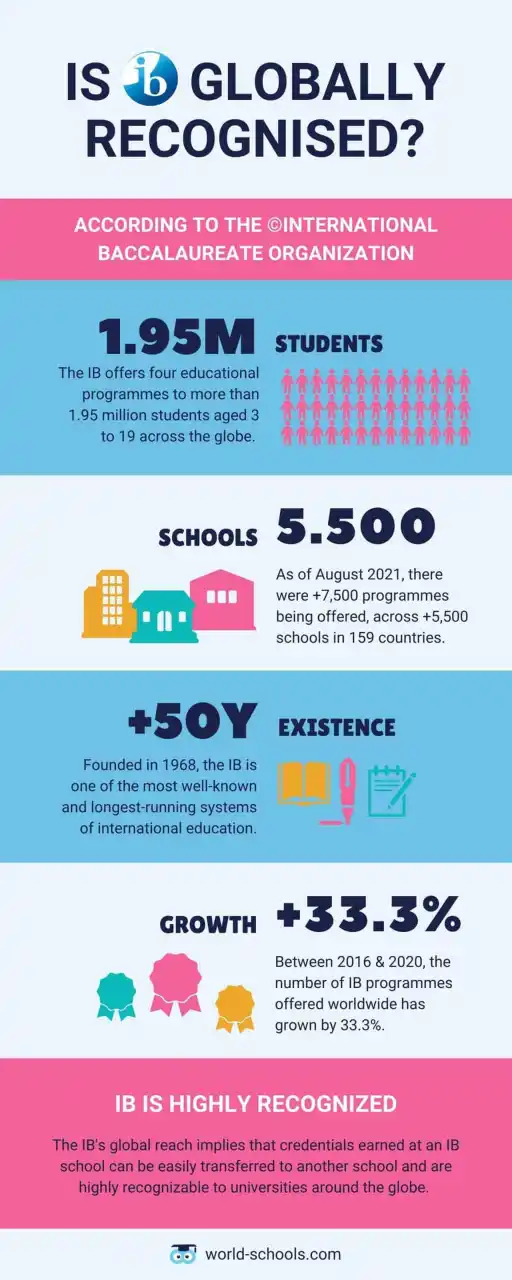We Asked Some of the Best International IB Schools in the World About What Makes The IB International Baccalaureate Stand Out! Let’s See What They Had To Say.
One of the most well-known and longest-running systems of international education is the International Baccalaureate (IB) curriculum. Founded in 1968 in Switzerland, the IB programme is now taught at more than 3,000 schools across more than 140 countries worldwide. The International Baccalaureate system is based on a student-centered approach to learning that is guided by experts and emphasizes both creativity and critical thinking skills.
The International Baccalaureate curriculum is one of the most popular education systems globally and is based on well-defined standards and holds students accountable for their work. The IB programme is highly transferable across countries and is recognized by top universities across the globe.
Schools from Madrid to Manila choose the International Baccalaureate Curriculum because they see it as the best choice for providing their students with a first-class education. Parents from around the world seek out IB schools to prepare their children for success at universities and beyond.
But for many parents trying to find the best school for their children, understanding the details of the International Baccalaureate Curriculum and what sets it apart from the other excellent international curricula can be a challenge.
This is why we brought together experts from some of the top international schools who use the International Baccalaureate Curriculum to help you understand what makes this curriculum unique and whether it may be the perfect fit for your child.
Table of contents
What Is the International Baccalaureate Curriculum and How Does It Work?
One of the first steps in selecting a great school for your family is understanding the curriculum they follow. There are several great options to choose from and each has amazing benefits for the students who study under that system.
Let’s take a look at what the International Baccalaureate curriculum looks like and how it works:

The International Baccalaureate Program is a curriculum framework that consists of four programmes of education, offered in schools all around the world to children from 3-19 years old.
With a rigorous, balanced approach, IB programmes aim to prepare students for the social, emotional, and intellectual challenges of a college education. Therefore, schools following the IB curriculum not only deliver content, but they also focus on developing vital skills in areas such as critical thinking and problem solving in order to make students successful learners and well-rounded people who are prepared for today and the future.
The International Baccalaureate curriculum is made up of three educational programmes:
- The Primary Years Programme: ( PYP – Kindergarten to Class 5)
- The Middle Years Programme: (MYP – Class 6 to Class 10)
- The Diploma Programme: ( DP – Class 11 to Class 12)
The International Baccalaureate (IB) is an international, transferable, common framework focussed on inquiry and driven by skills. The IB programmes develop students who are well-rounded by placing equal emphasis on development of the academic and personal.
The IB Curriculum offers a continuum of international education for students aged 3 to 19. It is taught in thousands of international schools in popular relocation destinations worldwide, including many independent and international schools and some state schools. The IB Curriculum is probably best known for its two-year Diploma Programme (DP), which is studied internationally by students between the ages of 16 and 19. More than 5,000 schools so far have chosen to teach International Baccalaureate® (IB) programmes.
The International Baccalaureate® (IB) Diploma Programme (DP) is one of the world’s most innovative educational courses. It focuses on personal, professional and academic development and is globally recognized by universities for the holistic and rigorous education it provides.
The International Baccalaureate, also known simply as the IB, is an internationally recognised programme for students aged 3-19. The IB programme aims not only to develop students’ knowledge in a range of subjects and disciplines, but also to help them become confident, self-motivated, and resilient global citizens.
Through the IB, they’ll come to understand different perspectives and join a community of learners who want to make the world a better place.
The IB inspires students to learn in a holistic way, with equal importance placed on many different yet interconnected subjects.
Read more about the IB’s three core components are Theory of Knowledge (TOK), The Extended Essay and Creativity, Activity and Service (CAS) and six subject groups (Language and Literature, Language Acquisition, Individuals and Societies, Sciences, Mathematics, and Creative Arts) on our NAE website to help you decide if it’s the right choice for your child.
An IB School uses the IB Learner Profile as a guide for developing student attributes so that we may nurture the ability of students to use a variety of necessary soft skills including communication, thinking, self-management, research, and social skills. Furthermore, we encourage mindful approaches to resilience, perseverance, inquiry, and being a principled and balanced individual. Students not only have a high level of academic and social skills but also a sincere appreciation and understanding of what it means to be global citizens and culturally competent.
As a full continuum IB World School, HIS students in Early Years – Grade 5 follow the IB Primary Years Programme (PYP). Students in Grades 6-10 follow the IB Middle Years Programme (MYP) and continue to the IB Diploma Programme (DP) in Grades 11-12.
The goal of the IB Primary Years Programme (PYP) is to build on a student’s natural curiosity and eagerness to acquire and master new information by developing a solid foundation of cognitive skills and learning habits through our inquiry-based approach to learning. The curriculum is transdisciplinary in nature. By the end of 5th grade, students advance to Upper School with not only a high level of academic and social skills but also a sincere appreciation and understanding of what it means to be global citizens and culturally competent.
Grades 6 – 10 follow the principles and practices of the IB Middle Years Programme (MYP). The MYP curriculum is interdisciplinary in nature, which connects some subject learning of Languages, Social Studies, Sciences, the Arts, Physical/Health Education, and Design/Computer Technology within interdisciplinary themes. In addition to these interdisciplinary subjects, students receive additional important personal and social guidance through an advisory/pastoral program that assigns a small number of students to one faculty advisor. Also, students will need to complete a Community Project in Grade 8 and a Personal Project in Grade 10.
The DP curriculum in Grades 11-12 is disciplinary in nature, with students generally selecting higher or standard levels in each of six subject groupings: Language A, Language B, Individuals & Societies, Science, Math, and the Arts. In addition, students have course requirements in Theory of Knowledge (TOK), complete a 4000-word Extended Essay (EE), and satisfy a significant expectation for Creative, Activity, & Service (CAS).
Regardless of age, students of the IB curriculum can be assured that they have access to the academic and life skills that will help them to succeed in the future.
The International Baccalaureate curriculum is a globally recognized educational programme designed to develop well-rounded, inquiring, and knowledgeable students. It offers four programmes for different age groups: the Primary Years Programme (PYP) for ages 3-12, the Middle Years Programme (MYP) for ages 11-16, the Diploma Programme (DP) for ages 16-19, and the Career-related Programme (CP) for ages 16-19 with a career focus. The IB emphasizes a holistic approach, international mindedness, and inquiry-based learning, aiming to foster critical thinking, intercultural understanding, and personal growth. Assessment methods include both internal and external evaluations, and educators undergo specialized training.
What Are the Benefits of The International Baccalaureate?
There are many benefits of the International Baccalaureate Program for students, here are a few of the key benefits:
Focus Beyond the Classroom to Real-world situations
Holistic Approach to Education
Highly Recognized Credentials Accepted at Universities Around the World
In an article featured in The Telegraph, John Claugthon, retiring Chief Master of King Edward’s School, sheds light on some of the reasons why schools all around the world choose to offer the IB Diploma Programme. He points to the breadth of the programme as one of the key motivations: “IB schools believe that the old dispensation to the narrow world of specialisation won’t do any more.” Many universities world-wide follow this line of thought, and an increasing number of them are revising their admissions criteria to attract more IB graduates.

Among other examples, Claugthon mentions King’s College, London, and points to the fact that 20 percent of the university’s new undergraduates are IB students. If you are looking for an education that stimulates and challenges you but also requires hard work, then the IB is the perfect place for you.
We at BEPS International School believe that a major difference between the IB Curriculum and other international curricula lies in the way you apply the IB curriculum. In our approach, our attention is heavily focused on offering meaningful and authentic learning to students. We place great emphasis on making sure students understand the importance of what they are learning and that they can link it and apply it to the outside world, into which they will eventually integrate.
The IB Programmes have been developed for and by international schools, and it is very important to us that the curriculum we adopted for our Secondary school was in line with our vision to develop students into global citizens.
The benefit of the IBDP over other post 16 routes is centered around the way the programme prepares students for life after school, both at university and beyond.
While traditional qualifications often focus on developing a deeper understanding of a limited number of subjects, students in the Diploma Programme study a wide array of subject groups. This means that every student acquires a broad understanding, whilst the interdisciplinary nature of the programme enables students to cultivate well-rounded, global-minded observations.
Having a broader grounding across multiple subject groups means students don’t limit themselves when it comes to applying for university places. When, throughout their time studying the Diploma Programme, a particular subject or area lights a passion within students and encourages them to want to pursue it in higher education, they can do just that and aren’t limited by taking a smaller number of subjects.
The IB Diploma Programme also gives students transferable skills when it comes to university. The extended essay is an excellent blueprint for university essays and dissertations, in terms of independent research skills, the longer form of the essay itself and the process of presenting and defending their essay orally. Activities like this also increase students’ confidence in presenting, which is a vital skill when they are interviewing for a place at Oxbridge, Ivy League or other world-leading universities.
The International Baccalaureate programme offers numerous benefits to students, educators, and schools, fostering a comprehensive and enriching educational experience. Some key benefits include:
- Global Recognition and Acceptance: IB qualifications are recognized and respected by universities and employers worldwide, often providing students with a competitive edge in college admissions and career opportunities.
- Holistic Education: The IB emphasizes the development of the whole child, including academic, social, emotional, and physical well-being. This well-rounded approach helps students develop a balanced and healthy lifestyle.
- Critical Thinking and Inquiry-Based Learning: IB programmes encourage students to think critically, ask questions, and engage in independent research, fostering a deep understanding of subjects and enhancing problem-solving skills.
- International Mindedness: The IB curriculum promotes global awareness and intercultural understanding, preparing students to navigate and contribute to an increasingly interconnected world.
- Rigorous Academic Standards: The IB’s challenging academic curriculum prepares students for higher education and beyond, developing strong work habits, time management skills, and a lifelong love of learning.
- Language Development: IB programmes place a strong emphasis on language learning, enhancing students’ communication skills and opening up opportunities for multilingualism.
- Community Engagement and Service: Through components like Creativity, Activity, Service (CAS) in the DP and Service Learning in the CP, students engage in community service and extracurricular activities, fostering a sense of responsibility and civic engagement.
- Personal and Professional Skills: The IB curriculum helps students develop essential skills such as critical thinking, collaboration, and self-management, which are valuable in both personal and professional contexts.
- Experienced Educators: IB teachers receive specialized training, ensuring high-quality instruction and a commitment to the IB’s educational philosophy and practices.
- Collaborative Learning Environment: The IB encourages collaborative learning and teamwork, helping students develop interpersonal skills and the ability to work effectively in diverse groups.
Is the International Baccalaureate Curriculum Recognized Globally and Is It Transferable?
The International Baccalaureate curriculum is now taught in more than 3,000 schools across more than 140 countries worldwide. This global reach means that credentials earned at an IB school can be easily transferred to another school and are highly recognizable to universities around the globe.
The IB curriculum places a high importance on developing skills and attitudes. When students are regularly transferring from one school to another, the content (even within the same curriculum) may not always be the same, but the ability to think critically, to learn independently, to work together with others, to analyse research, to solve problems, and to take responsibility for their own learning are all transferable and allow easy transition from an IB school into any other school.
For example, here at BEPS we have had students arrive from locations as diverse as Gabon, Hong Kong, and Colombia and have had leaving students successfully join IB schools in other countries. We also see students reintegrating into local schools in their home country. Our IB coordinator has worked with students who have gone on to higher education locally in Belgium, in the UK, and across Europe, Australia and Asia.
Our IB school programme opens doors to the best universities in the world. Universally recognised as the world’s premier 16-18 qualification, the IBDP offers a broad choice of subjects and extraordinary learning experiences. Creating ambitious, socially responsible young people, the programme sets our students up for international success.
Our Year 12 and 13 students study the IBDP. The programme is completely unique because it is not based on a particular national education system. Instead, it offers a breadth and balance that gives our students unrivalled choice, delivers once-in-a-lifetime learning experiences, and enables them to follow their talents and ambitions.
Really importantly, the IBDP is a truly international qualification. Followed by thousands of students worldwide, it nurtures our students’ understanding of, and respect for, different cultures, ideas, and beliefs.
The International Baccalaureate curriculum is globally recognized and valued by universities and employers. Its rigorous academic standards and holistic approach prepare students well for higher education and careers. The curriculum’s consistency across countries allows for easy transfer between IB World Schools, making it a flexible and desirable option for internationally mobile families.
Which Schools Can Offer the International Baccalaureate Curriculum?
Only school who are authorised are eligible to deliver any of the programmes. Candidate PYP and MYP schools can use the framework before authorisation but are not considered IB world schools and their students are not eligible to take part in external assessments. Schools must be authorised before offering the DP or CP.
Our students follow the best in British and international curricula, including the English National Curriculum, Cambridge IGCSE, and International Baccalaureate Diploma Programme (IBDP) for our Year 12 and Year 13 students.
To offer the IB Curriculum, schools must successfully complete a rigorous authorization process that ensures it meets the IB’s high standards for academic rigor, teaching quality, and adherence to the IB’s mission and values.
Schools that can offer the International Baccalaureate curriculum must be authorized by the International Baccalaureate Organization (IBO). The authorization process ensures that schools meet the high standards required to implement the IB programmes effectively. Public, Private and International Schools are allowed to offer the IB curriculum.
What to Look for In A Great International Baccalaureate School?
There are 3 Important Things to Consider When Looking for an IB School:
1. Accreditations
2. Resources
Effective IB school are well resourced and offer many options to meet the diverse needs and interests of their students.

3. Global ranking
When looking for any school it is important to identify what you consider to be most important in education. Are you focussed on results, on holistic development, a content focus, or skill development? You will find IB schools which range from the traditional to the innovative. Look around and find something that fits with you.
Often when we plan a particular learning experience, there are multiple levels on which the students learn. One aim of BEPS Secondary School is to develop transferable skills through ‘hidden curriculum’ like collaboration and time management and make them explicit. We aim to create environments where learning is visible on multiple levels and for multiple goals; academic, personal, social, and emotional.
A high-quality International Baccalaureate (IB) school embodies the IB’s core values, which include encouraging students to be curious and inquisitive, maintain balance in their lives, demonstrate integrity and moral character, strive for knowledge and understanding, take calculated risks, communicate effectively, approach new ideas with an open mind, exhibit compassion and empathy towards others, and engage in reflective thinking. Additionally, an exceptional IB school provides a supportive and inclusive environment that enables all students to realize their full potential.
- Authorization: Ensure the school is officially authorized by the IB Organization.
- Students’ Experience: Look for comprehensive academic and emotional support, personalized instruction, and strong university and career counseling.
- Faculty Training: Ensure teachers are well-trained in the IB curriculum and receive ongoing professional development.
- IB Implementation: Assess how effectively the IB philosophy is integrated into school culture, including extracurricular activities, CAS, and community engagement.
Is the International Baccalaureate Curriculum Right for Your Child?

The International Baccalaureate Curriculum is a fantastic choice for many students; however, the choice of which school and which curriculum is the best is a very personal one. In general, if your family is looking for a globally-focused education that will prepare your child for university and beyond, the International Baccalaureate Curriculum is a great choice.
This is a highly subjective question but given that the IB curriculum prides itself on being inclusive and broad as well as holistic in nature we believe that all students will benefit from an IB education.
IB students develop strong academic, social, and emotional characteristics. They are also likely to perform well academically – often better than students on other curricula.
While the IB Diploma Programme is widely recognised to be the most challenging course of study, universities worldwide respect the IB Diploma Programme as a prestigious and desirable qualification and look for this credential on applications. This demanding programme offers students the opportunity to go above and beyond in their education and study anywhere in the world. Additionally, the IB Diploma Programme offers students the potential to earn university credits.
The perceived level of difficulty of the IB Programme will vary from student to student. The IB Programme is an academically challenging programme that is best suited for students who are willing to dedicate themselves to advanced courses, work well in a structured environment and can address areas of improvement.
To help you decide if it’s the right choice for your child, we’ve summarised the IB’s three core components, six subject groups, approaches to learning and teaching and FAQs on our NAE website.
The International Baccalaureate programme is ideal for students due to its holistic approach, emphasis on critical thinking, global perspective, academic rigor, and comprehensive support. It prepares students well for higher education and fosters both personal and academic growth.

